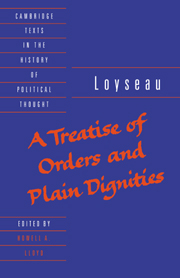Book contents
- Frontmatter
- Contents
- Acknowledgements
- Introduction
- Principal events in Loyseau's life
- Bibliographical note
- Note on translation and citations
- List of abbreviations
- Biographical notes
- Dedicatory epistle: Charles Loyseau to the Honourable Jean Forget
- Preface
- 1 Of order in general
- 2 Of the Roman orders
- 3 Of the order of the clergy
- 4 Of the order of nobility in general
- 5 Of plain gentlemen
- 6 Of the high nobility
- 7 Of princes
- 8 Of the third estate
- 9 Of solemn deprivation of order
- 10 Of the plain dignities of Rome
- 11 Of the plain dignities of France
- Index
- Title in the Series
6 - Of the high nobility
Published online by Cambridge University Press: 05 June 2012
- Frontmatter
- Contents
- Acknowledgements
- Introduction
- Principal events in Loyseau's life
- Bibliographical note
- Note on translation and citations
- List of abbreviations
- Biographical notes
- Dedicatory epistle: Charles Loyseau to the Honourable Jean Forget
- Preface
- 1 Of order in general
- 2 Of the Roman orders
- 3 Of the order of the clergy
- 4 Of the order of nobility in general
- 5 Of plain gentlemen
- 6 Of the high nobility
- 7 Of princes
- 8 Of the third estate
- 9 Of solemn deprivation of order
- 10 Of the plain dignities of Rome
- 11 Of the plain dignities of France
- Index
- Title in the Series
Summary
1. The closing remarks of the last chapter put me in mind of an amusing question which Chasseneuz and Tiraqueau raise: whether the common saying of our country gentlemen can be sustained, ‘that they are as much gentlemen as the king’. Both of them reject it, partly on the strength of the passages from Cicero and Aristotle that have just been cited, but above all because, as is well known, there are many degrees in the order of nobility.
2. For my part, I freely confess that this comparison of the subject with his king is odious, insolent and well-nigh blasphemous. Yet I consider it to be inherently true, given that whoever is absolutely and perfectly a gentleman cannot be more so, as that passage from Aristotle clearly states. It is also the case that true order is a substantive quality, positive and – as with substance in dialectic – not susceptible of increase nor of decrease. Thus, it is true to say that the lowest priest is as much a priest as the greatest bishop; and the lowest bishop, so to speak, is as much a bishop as the pope. This is the solution to the famous passage from St Cyprian which those of the so-called reformed religion allege against us: ‘the rest of the apostles undoubtedly formed, with Peter, a community equal in both honour and power’ – that is, to the extent that they were apostles.
- Type
- Chapter
- Information
- A Treatise of Orders and Plain Dignities , pp. 116 - 137Publisher: Cambridge University PressPrint publication year: 1994



